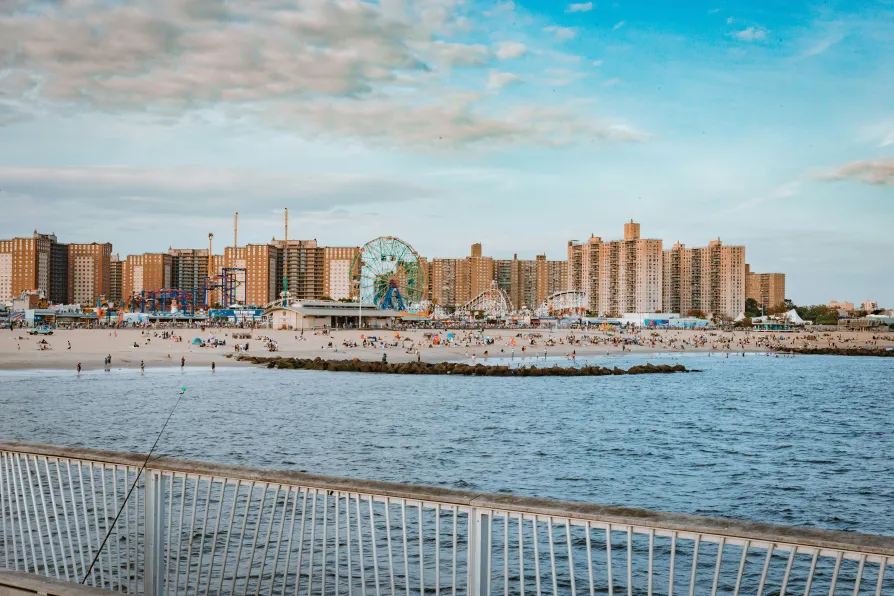
 Coney Island
[Jessica D. Vega / CC]
Coney Island
[Jessica D. Vega / CC]
AS THE world’s biggest sports teams become more and more detached from the communities in which they reside and are increasingly used as tools in global power struggles for capital, influence, or international reputation, the work of grassroots level community institutions and sports teams is vital.
Across the world of football, clubs lower down the leagues are often the ones who will be the most active in and connected to their communities.
Despite often having a lower profile nationally or globally, and often running on limited financial resources themselves, these clubs make the extra effort to work with and support the areas in which they are embedded.
The Morning Star has regularly reported on teams in England carrying out such work, including City of Liverpool FC, Dulwich Hamlet and Lewes. They are part of a growing movement in grassroots football worldwide at various professional, semi-pro, and amateur levels.
Across the Atlantic, in one of the most high-profile cities on the planet, similar important work goes on below the surface, on the ground on the soccer fields and in the soup kitchens.
In the Coney Island neighbourhood of New York City on Thursday, a group of students and local football clubs came together to support the Coney Island Lighthouse Mission’s ongoing food drive.
The Mission’s mission is to fight food poverty in their local community, providing meals to thousands of people each week.
It also provides space and resources for other needs such as an after-school drop-in centre providing tutoring, activities, and space for students to work.
As well as tackling the immediate issues related to hunger and poverty in the area, the Mission works towards helping families become self-sufficient.
This week, students from the Robert Louis Stevenson School volunteered to support the Mission in its weekly work to combat food insecurity.
They were assisted by representatives from local football teams New York International FC (NYIFC) of the local semi-pro and amateur Cosmopolitan Soccer League (CSL), and Brooklyn FC, a new professional team in the city that will join the USL Championship in 2025.
Since forming in 2019, NYIFC have become increasingly involved in supporting those in need in the city.
Players, coaches and supporters regularly contribute to the efforts at another local soup kitchen and resource centre based in the East Village area of the city, EV Loves NYC.
They have also welcomed the migrant centre located at one of their home fields on Randall’s Island as other clubs and organisations involved in the management of the island, which contains more than 60 playing fields, have opposed it.
Last Sunday, New York International triumphed on the pitch in the CSL John Kilby League Cup, winning the final against Central Park Rangers.
EV Loves NYC posted on their Instagram story after the game: “Tonight, NYIFC, the football club which has done so much for us, beat the Central Park Rangers, the team who tried to remove the migrants from Randall’s Island, in the Kilby Cup Final. Good guys won.”
Earlier this year, Brooklyn FC announced that it would play its home games at Maimonides Park, a picturesque setting beside the beach and boardwalk of Coney Island, just a couple of blocks away from the Lighthouse Mission.
It made sense for Brooklyn FC to get involved. Their men’s team will not begin play until 2025, and its women’s team will kick off in the new professional league, the USL Super League, later this year, but they are already eager to contribute to the Brooklyn communities from which they will draw a fanbase.
The imagery and branding around this new team have drawn heavily on the local environment in Brooklyn, from Brooklyn Bridge to Coney Island.
Robert Louis Stevenson School’s athletics director Nick Alexandrakos has played a key role in bringing all of this together.
Alexandrakos is a fan of the New York Cosmos, one of few American soccer teams whose name is recognised globally but one that is currently on an uncertain, indefinite hiatus.
When the team was active, Cosmos fans would volunteer at the Mission, and the involvement of other football teams and the students from Robert Louis Stevenson School is partly a continuation of this.
“Today our student-athletes made a bold decision to help combat food insecurity directly with their most powerful tool: compassion,” Alexandrakos said.
“These future leaders of NYC fully understand that Herculean acts are not needed. Instead, modest, collaborative efforts can make a meaningful impact.
“At the risk of sounding overly optimistic, I’m confident that the future of our cosmopolitan city will be in good hands because, ultimately, the kids are alright.”
In a search for another club with inclusive and cosmopolitan values, some Cosmos supporters, including Alexandrakos, found the burgeoning grassroots club, NYIFC, tying together football support and community support.
As local collaborative movements such as these continue to grow, incorporating football clubs and associations as part of the effort, there is hope for change.
Alexandrakos’s optimism is reflected and shared elsewhere at clubs around the world. Local efforts, combined to create a global movement through sport and football.

STEVEN ANDREW welcomes a fine introduction to FC United of Manchester, the team set up in opposition to Manchester United

JAMES NALTON writes how at the heart of the big apple, the beautiful game exists as something more community-oriented, which could benefit hugely under mayoral candidate Zohran Mamdani












